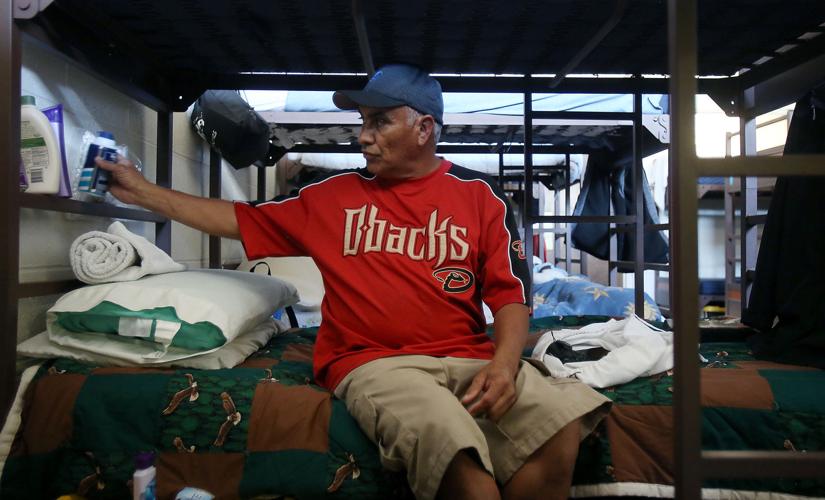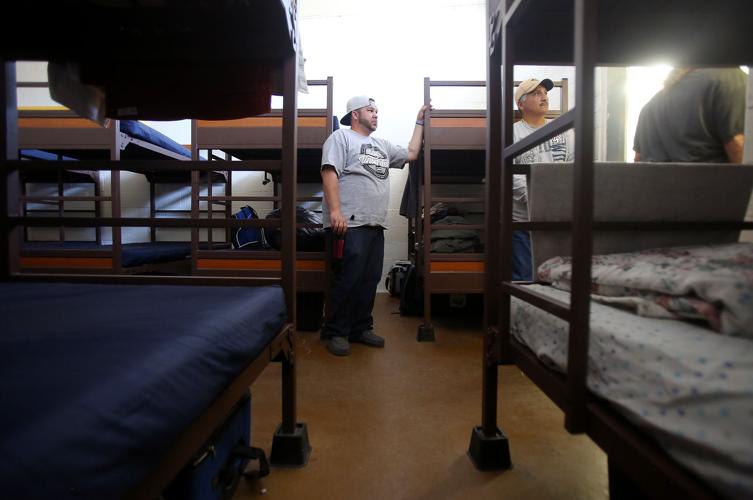South Tucson’s Fire Department enforced a building safety code that reduced a men’s homeless shelter from 106 to 55 beds, effective Monday.
After getting notice last week that the code would be enforced, the Gospel Rescue Mission men’s center, 312 W. 28th St., found emergency shelter for 46 men at other shelters, including programs operated by the Salvation Army and the Primavera Foundation, said Wes Shepherd, the center’s client services coordinator.
But Monday night, some homeless men were turned away.
Sixto Molina, who started his new position of South Tucson city manager last week, said he questioned the Gospel Rescue Mission’s occupancy for safety reasons because of the recent sentencing of a man who started a fire on the property in 2016.
Molina’s inquiry led a fire department administrator and building inspector to investigate the center’s occupancy rate, and they determined the men’s shelter could only house 55 beds under a 2012 International Building Code that was adopted by the city, Molina said.
“We know they provide a tremendous service to the community, but we can’t ignore the safety factor,” said Molina. He said the fire department responded to 141 calls for service in 2016 at the rescue mission.
The social-service agency will look to buy property for a new 200-bed men’s shelter, but in the meantime, advocates for the homeless are concerned that more will sleep in parks, under bridges, in washes and in desert camps.
The rescue mission was founded in 1953 and began operating in South Tucson in 1956, providing overnight shelter to about 60 men for decades. In 2004, the city approved 110 beds for the shelter, administrators said.
“The Gospel Rescue Mission has long recognized the need for more beds for men,” said Kim Ward-Morelos, its director of development and community outreach.
“The Board of Directors sees the need for 200 beds. This is the impetus to move forward to look at a men’s center.”
Ward-Morelos said the board is looking at properties to possibly build or buy a building that is close to bus lines and provides easy access to other community services its clients need. There is no target date when this might happen, said Ward-Morelos.
The men’s center provides multiple services, including extended shelter, a substance-abuse recovery and prevention program, education and job training, employment assistance and career counseling. It also offers health care and legal assistance, and housing programs. The rescue mission works with about 30 other agencies.
On Monday, Brian Turner stopped at the rescue mission for a meal, shower and clean clothes. He was turned away for emergency shelter for the night.
The 42-year-old man, who said he has worked as a flagger for road construction projects and as a driller on an oil rig, planned to sleep in a north-side park.
In the morning, said Turner, he plans to search for day labor and is hoping to save money to repair his truck.
Jonathan Drake, 35, who is enrolled in the rescue mission’s extended program to get his life back on track and hopes to work in restaurant management, said he is thankful for a bed to sleep in.
Drake said he traveled from Eugene, Oregon, to Tucson and was camping in the desert for about a month before coming to the rescue mission. He said he feels bad for the other men seeking emergency shelter who now cannot be taken in.
“The impact will be most significant for homeless men during inclement weather,” said Ward-Morelos, mentioning triple-digit heat and monsoon storms in the summer, and freezing nights in winter.
The rescue mission operates a shelter for women and children at 707 W. Miracle Mile. That shelter provides 100 beds.





